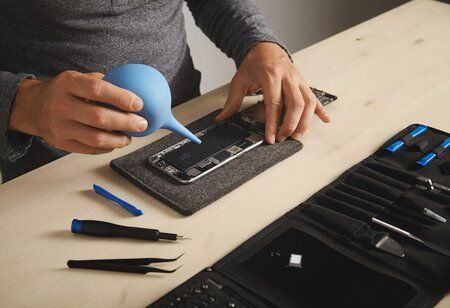Apple has Now Allowed People to Utilize Used Parts to Fix their iPhones
By Consultants Review Team
 Apple recently revealed a significant update to its repair procedure that would simplify the process for both consumers and independent repair companies to mend iPhones with repurposed Apple components. Some iPhone models will be able to be repaired using these recycled parts in the upcoming months. With this change, consumers will have more alternatives, their gadgets will live longer, and the environmental effect of repairs will be lessened.
Apple recently revealed a significant update to its repair procedure that would simplify the process for both consumers and independent repair companies to mend iPhones with repurposed Apple components. Some iPhone models will be able to be repaired using these recycled parts in the upcoming months. With this change, consumers will have more alternatives, their gadgets will live longer, and the environmental effect of repairs will be lessened.
Senior vice president of Hardware Engineering at Apple, John Ternus, clarified that the company always aims to give its consumers the greatest possible experience while also taking the environment into consideration. Apple has been working hard over the last two years to ensure that recycled parts adhere to the same privacy, security, and safety requirements as new ones. Apple intends to increase consumer convenience and increase product longevity with this new move.
Assuring authentic and safe-to-use recycled components was one of Apple's concerns. To "pair" these components to the device and make sure they adhere to all requirements, Apple has created a procedure. After a genuine Apple part is inserted, the device will be calibrated, regardless of whether it is new or recycled. This implies that recycled biometric sensors will be supported in next iPhone models as well.
Apple is doing away with the need that consumers and repair businesses give the device's serial number when placing component orders for specific kinds of repairs in an effort to streamline the repair process. In order to stop stolen iPhones from being used as spare parts, Apple is now expanding the usage of its Activation Lock function to include iPhone components. If this feature determines that a recycled component originated from a device that has Lost Mode or Activation Lock activated, it will limit the calibration of that recycled part.
Additionally, Apple thinks it's critical that a device's whole maintenance history be available to its second or third owners. As a result, Apple plans to add the ability to determine whether a part used in a repair is new or recycled to its Parts and Service History feature.
This statement is a component of Apple's continuous endeavor to increase accessibility to reasonably priced and safe repairs. Apple has almost increased the number of service centers with access to authentic Apple components and training over the last five years. Launched in 2022, the Self Service Repair program currently covers 40 Apple devices in 33 countries and regions, providing authentic parts, tools, and manuals to anyone with the requisite repair skills.




